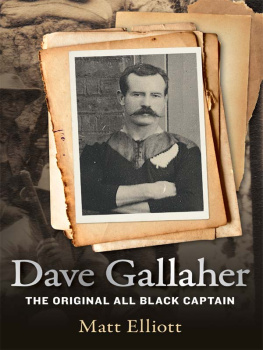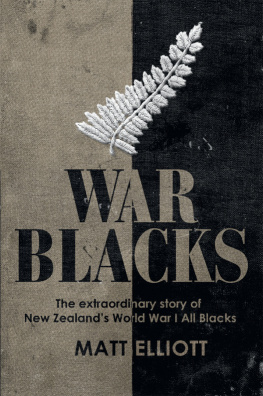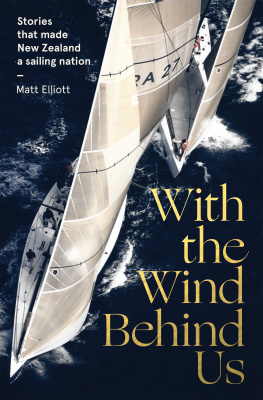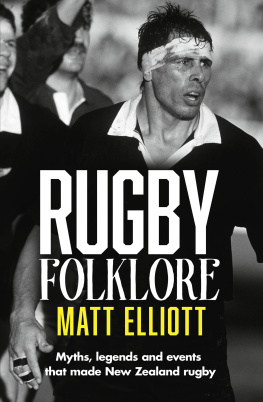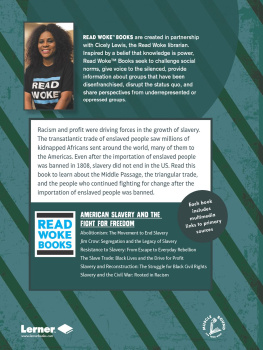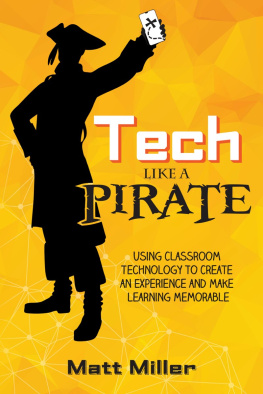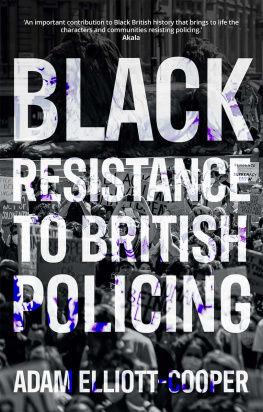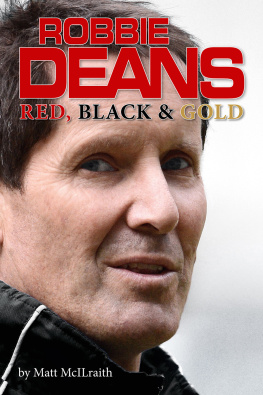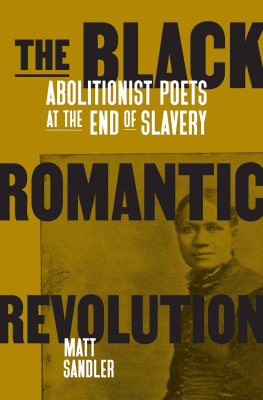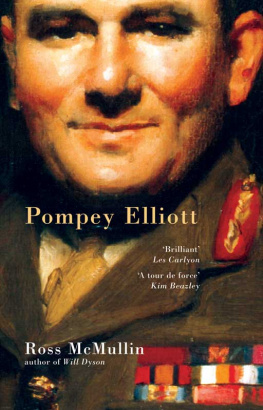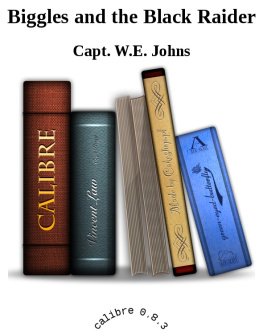Matt Elliott - Dave Gallaher: The Original All Black Captain
Here you can read online Matt Elliott - Dave Gallaher: The Original All Black Captain full text of the book (entire story) in english for free. Download pdf and epub, get meaning, cover and reviews about this ebook. year: 2012, publisher: HarperCollins, genre: Home and family. Description of the work, (preface) as well as reviews are available. Best literature library LitArk.com created for fans of good reading and offers a wide selection of genres:
Romance novel
Science fiction
Adventure
Detective
Science
History
Home and family
Prose
Art
Politics
Computer
Non-fiction
Religion
Business
Children
Humor
Choose a favorite category and find really read worthwhile books. Enjoy immersion in the world of imagination, feel the emotions of the characters or learn something new for yourself, make an fascinating discovery.
- Book:Dave Gallaher: The Original All Black Captain
- Author:
- Publisher:HarperCollins
- Genre:
- Year:2012
- Rating:4 / 5
- Favourites:Add to favourites
- Your mark:
- 80
- 1
- 2
- 3
- 4
- 5
Dave Gallaher: The Original All Black Captain: summary, description and annotation
We offer to read an annotation, description, summary or preface (depends on what the author of the book "Dave Gallaher: The Original All Black Captain" wrote himself). If you haven't found the necessary information about the book — write in the comments, we will try to find it.
Dave Gallaher: The Original All Black Captain — read online for free the complete book (whole text) full work
Below is the text of the book, divided by pages. System saving the place of the last page read, allows you to conveniently read the book "Dave Gallaher: The Original All Black Captain" online for free, without having to search again every time where you left off. Put a bookmark, and you can go to the page where you finished reading at any time.
Font size:
Interval:
Bookmark:

To my brother Joseph Carlaw Elliott, for whom there are
three things in life: family, faith and football.
T ravel through small towns in New Zealand and you will invariably see two things. The first is a war memorial statue or column erected in the years after the First World War, remembering those from the local community who did not come back. Most of these memorials feature the names of brothers, fathers and sons who made the ultimate sacrifice. It left these little communities with a sadness that is almost palpable even today when one reads the inscribed names.
The other sight is a field with a set of rugby goalposts on it. These big, white Hs have also stood for years; another memorial to those men from the town who looked forward to a Saturday afternoon chasing the oval, being part of local rivalries that have a fierce intensity for 80 minutes, perhaps once a year. In many instances, at the entrances to these grounds are memorial gates of stone or wrought iron, combining the remembrance of the sacrifice made by local men with that of their local passion. Boys grew into men on these fields. They grew up wanting to be All Blacks, to wear the black jersey, to represent their country at our game. While being the toast of the country for winning on the football field against arch rivals has its own importance, the real heroes have been those boys and men who have fought for their country. They are the ones who really knew what it was like to experience trench warfare, to reach the do or die moments, to find themselves under a bomb, to put their bodies on the line when the coach rolls out the big guns all the phrases that are now such a part of sporting parlance, but which have a deeper, much more sombre resonance when one really thinks about them.
Mention of Dave Gallaher reminds us of the early glory days of New Zealand football, and the important foundation stones which he played a part in laying, on which one of sports most revered and successful teams would be built. When the All Blacks perform the haka before matches in the United Kingdom and Ireland, we see a tradition that is as old as our encounters with those traditional foes. The haka has changed, but so has the game and all that revolves around it. As much as some writers regularly object to its presence in oft-repeated, pre-match wind-ups, when taking a broader view of the history of the game the All Black haka is a unique piece of cultural and sporting theatre. It was used as an entertainment, an offering of something unique from Maoriland, to opposing players and spectators. It still is, but the national rugby team no longer says merely that our identity is that of Maorilanders. The haka also says that in New Zealand not only the game but also the history of the game and those who have worn that black jersey with the silver fern on the breast are inseparable parts of our love of the sport.
Gallahers name also reminds us of the tragedy of war, and particularly pertaining to New Zealand of that place called Passchendaele, where so many men represented their country with pride, in something bigger than sport, where they didnt want to let down their mates and where their lives were cruelly ended. Thousands are honoured in graves which extend plot after plot, row after row, in war cemeteries near the battlefield where they died. Many remain Known only unto God.
We can only wonder what the future contributions by Gallaher to his community and football could have been were he to have returned from the war, but even in death his influence and legacy are enduring.
Rugby has a wonderful oral tradition built from the retelling of stories over bar-leaners, kitchen tables, and sideline pickets. Players become legends, as do their accomplishments. Many of us have grown up hearing those oft-told stories, so it is exciting for the writer when research throws up confirmations of old tales or additional information on the lives of those who feature in them. One of the unexpected surprises during the two years of research for this book was, while looking up the medical records of Daves mother, coming across an entry for Dave as a boy. I was also fortunate to come across a scrapbook that was compiled by Charles Stitchbury, who was a stalwart of the Ponsonby club as a player and a committee member, and also manager of the Auckland team during Gallahers years as selector/coach. This provided a wonderful snapshot of activities of the Ponsonby club on and off the field 11 decades ago. I hope that some of the findings within add to the rich history of the game, be it through adding new insight into our past or starting new debates, but also by giving a fuller picture of one of the most important figures in New Zealand rugby history.
I have no hesitation in acknowledging the decade-long Gallaher family research done by Kay Carter, granddaughter of Daves brother Oswald. Her work, while reassuringly confirming aspects of my own research, also gave me a more definite picture of the wider Gallaher family relationships. It was a real pleasure to meet up with her when she and her husband Bill were in Katikati presenting her family history to relations.
Gallahers direct descendants are private, humble people. They, like Dave, see him as but one part of a now much larger group of men: the All Blacks. They also know that there was more to him than just being a footballer. Special thanks to Adrienne Tubbs, a great-granddaughter of Gallaher, for the time she gave me.
For ease of description I have referred to New Zealand rugby teams as the All Blacks in all instances, and also use the moniker The Originals for the 1905 tourists. There is not space in this book to offer a play-by-play description of each match on the 1905 tour of Great Britain and Ireland. Besides, in commemoration of the centenary of that tour, three books were published in New Zealand doing just that. They are recommended to those wanting to focus on the detail of the tour, as they range from the strictly historical scrapbook record of Bob Howitt and Dianne Haworths 1905 Originals and Christopher Tobins album, The Original All Blacks 190506 , to John McCrystals superb, interpretive account of the tour, The Originals: 1905 All Black Rugby Odyssey . I owe a debt of gratitude to rugby writers and historians such as Neville McMillan, Rod Chester, TP McLean, Ron Palenski and Lindsay Knight (to name just five) who have kept the vibrant history of the game alive.
Thanks are due also to: Max Cryer; Tony Johnson for his thoughts on Gallaher and his 1905 teammates; Brian Finn and Charlotte Wilson at the New Zealand Rugby Union; Dave Syms, Auckland Rugby Union; Bryan Williams, Ponsonby Rugby Club; George and Ina Hermes, www.ramelton.net; Paul Paton, archivist at Auckland Grammar School; Robert Love; staff of Birkenhead Public Library; Keith Giles, Photographic Librarian, and Auckland Public Librarys Sir George Grey Special Collections staff; Archives New Zealand (Auckland and Wellington); Jocelyn Chalmers, Alexander Turnbull Library; Martin Collett, Auckland Museum Library; Grant Little; Alison Brook, Vicki Marsdon, Eva Chan, Kate Stone and Anna Bowbyes (HarperCollins).
More personal thanks to Mel for her support, suggestions and map creation, and to Murray for his ongoing interest.

The Gallaghers prospects were poor.

A t the 2011 Rugby World Cup in New Zealand, thousands of fans going to and from Eden Park for matches stopped to admire the recently erected statue of David Gallaher, captain of the 1905 All Blacks. Those who knew their rugby history admired the depiction of the famous footballer. Others read the legend bearing an outline of his career and his contribution to football in New Zealand. Some stood in front of the statue to be photographed, while others (who may have imbibed liberally of one of the tournaments chief sponsors product) posed comically, trying to tackle the bronze figure. Generally, there was a sense of reverence towards the statue that, as an initiative of the Ponsonby Rugby Club, had taken 15 years to have made and placed, in time for the World Cup, on the outskirts of one of world rugbys most famous grounds.
Font size:
Interval:
Bookmark:
Similar books «Dave Gallaher: The Original All Black Captain»
Look at similar books to Dave Gallaher: The Original All Black Captain. We have selected literature similar in name and meaning in the hope of providing readers with more options to find new, interesting, not yet read works.
Discussion, reviews of the book Dave Gallaher: The Original All Black Captain and just readers' own opinions. Leave your comments, write what you think about the work, its meaning or the main characters. Specify what exactly you liked and what you didn't like, and why you think so.

